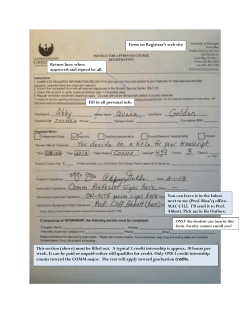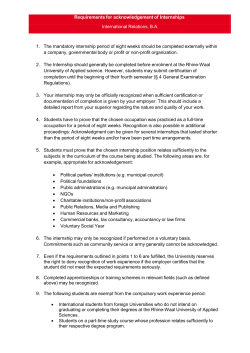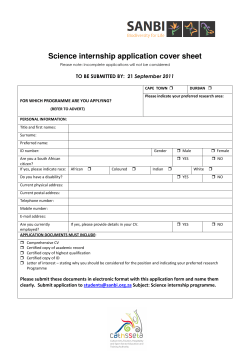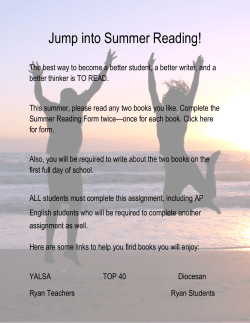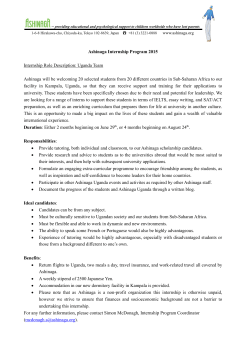
Career readiness
A Career Readiness Program for StudentAthletes Timothy D. Ryan Kelly Penwell Robert H. Baker Richard L. Irwin NCAA Innovation Grant Investigators Tim Ryan (PI): Associate Professor Sport & Leisure Management Past research in role conflict & USA Swimming (minority participation) Kelly Penwell Former Director of the Experiential Learning Lab University of Memphis Currently Associate Dean Workforce Development Solano Community College Richard Irwin Professor and Interim Vice Provost, Academic Innovation and Support Services (Experiential Learning Lab and the Finish Line Degree Completion Program.) Bob Baker: Director of the Center for Athletic Academic Services. Program Development • If replicating Focus on Career Transitions Authentic learning experiences; credit bearing Similarities between Student-Athletes and Non-Traditional Students Community Partnerships Support from Athletics Key faculty & administrators must meet – Not trading email – Know schedules – Know opportunities Student-Athlete Participants • • • • • • 20-25 interested SA, primarily in football One female Mostly upper class-level students Various majors Cohort Range of backgrounds • Primary target under-prepared student athletes • 7-credit hours (4 in summer, 3 in fall) • Start fall work in summer Approach to Workforce Development Entrepreneurship Project Based Learning ( Social Entrepreneurship) Internship Field Placement Workplace Readiness Part One: Entrepreneurship • • • • • Problem Solving Decision Making Creativity Innovative Thinking Oral and Written Communication • Empowerment • Perseverance • Three credits Part Two: IDEATE • • • • • • • • Application of entrepreneurial skills Critical thinking Analysis Innovative solutions Presentations Onsite visit Independent Teamwork • One credit Part Three: Professional Development • Not just presented but modeled • Interactive skill building – Goal Setting – Resume Prep – Mock interviews – Professional Dress – Networking Part Four: Internship • Application of Professional Development • Interviewed pre-placement • Multiple Partners ServiceMaster SoGiv Youth Athletes Performance • Orientation • Tour • Three Academic Credits Outcomes & Measurement • Career Planning Confidence Scale (McAulliffe et al., 2006 ). Paired design (pre-test & post-test) • • • • • • 15 started program, 14 successful completers parts1-3, 9 completed internship Clear difference on resumes LinkedIn profiles established Tangible projects completed Feedback Participants Site supervisors Instructors Positives • Life impact SA connect with instructor (critical) SA connect with site supervisor • Stronger connection with partners • Coaches see benefit • Program can translate to non-traditional students Discussion points (changes) • Student “pass” before progressing to internship Break non-internship classes into 1-2 hour modules that students must pass. • Internship site team part of program selection process • More support from coaches? • Underprepared student culture • Tension Increased student success by selecting “better” students What does that leave for those who need it most? Thank you • NCAA • ServiceMaster (Rob Gillette, Amy Moen, Kendra Taylor, Andrea Hough) • Northwestern Mutual (Brigitte Manly, March Mims, Brittany Alexander, Andria Simonsen, Brandon Johnson, Mark Prudhomme, Ben Prudhomme) • Habitat for Humanity Greater Memphis (Dewayne Spencer, Julie Romine, Greg Webb, Jessica Hord) • SoGiv (Edward Bogard) Questions & Comments Tim Ryan – tdryan@memphis.edu Kelly Penwell – Kpenwell@solano.edu
© Copyright 2025

